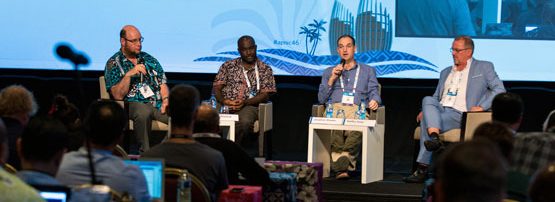
The technical program on the first day of the APNIC 46 conference kicked off with a panel discussion on the provision of satellite Internet to the Pacific Islands.
Haroun Rashid of Emstret VSAT in Papua New Guinea, Steffen Holzt of Speedcast, Jon Brewer of Telco2, and yours truly as Chair, sat on the stage and were well supported by questions and comments from the audience.
Jon’s keynote presentation in the morning [The Connected Pacific: Cables, Satellites, & Metrics] had already laid an excellent foundation for the session, bringing us up to date on the status of international fibre connectivity in the Pacific. He also gave a brief introduction to satellite connectivity concepts.
The discussion showed that satellite connectivity is still a necessity for many islands but doesn’t sit easily with many. As the number of islands on fibre steadily increases, satellite connectivity retreats to areas without a viable business case for cable.
Panel members still saw a bright future for satellite Internet. I started the questions off by asking what panel members would focus on if they were an island ISP looking for a new satellite contract.
Haroun’s main concern was the ability to adapt contracts to changes such as new technology. Jon recommended that ISPs look at the characteristics of various links and consider link diversity to deal with effects such as rain.
Steffen said that while most customers currently concentrated on price, this had come down to sometimes less than USD 500 per Mbps/month and contracts could be had for short periods. He also advised ISPs to look at link diversity and at the whole package with upstream connectivity.
Satellite and alternative Internet technologies of the future
The first question from the audience took the panel into the area of low-earth orbit (LEO) systems. Details on LEOs are currently rather speculative: who will succeed at providing them, and what exactly will these systems look like? At present, there are no obvious technical standards emerging. Several consortia are gearing up for bids, but the technical, logistical, and regulatory challenges remain significant. Expect teething problems!
LEOs are likely to replace the conventional ‘trunk to island ISP’ business model, which already faces competition from direct-to-site services such as Kacific. LEO systems are likely to be direct-to-customer systems, which puts them on a collision path with monopoly ISPs. Expect disruption!
Read: GEO vs MEO: which satellite solution works best?
From the floor, Geoff Huston brought up the question of potential alternatives in the form of balloons and drones, with projects such as Google Loon, Facebooks Aquila and Airbus’ Zephyrs, among others. Panel members were sceptical that these would progress beyond the proof-of-concept stage, with issues of reliability, cost, safety (what happens when a drone crashes?), and backhaul unresolved.
The issue of latency on satellite links was also discussed, with many regarding it as a necessary evil until there is a suitable LEO alternative. Caching takes some of the heat off here but is often thwarted by lack of caches in the Pacific Islands, the lack of scale to make them effective, and encrypted connections. Not every type of cache is suitable for overnight fill!
IPv6, a staple topic at APNIC events in recent years, is mostly not used at present as most modems are not IPv6 capable. However, it is likely to be seen increasingly in years to come (as we’ve seen in Tokelau with their preliminary IPv6 efforts). We may need to think about header compression, though, which should be pretty straightforward, at least in the trunk-to-ISP scenario.
Watch a recording of the full session below.
Ulrich Speidel is a senior lecturer in Computer Science at the University of Auckland with research interests in fundamental and applied problems in data communications, information theory, signal processing, and information measurement. His work was awarded ISIF Asia grants in 2014 and 2016.
The views expressed by the authors of this blog are their own and do not necessarily reflect the views of APNIC. Please note a Code of Conduct applies to this blog.
